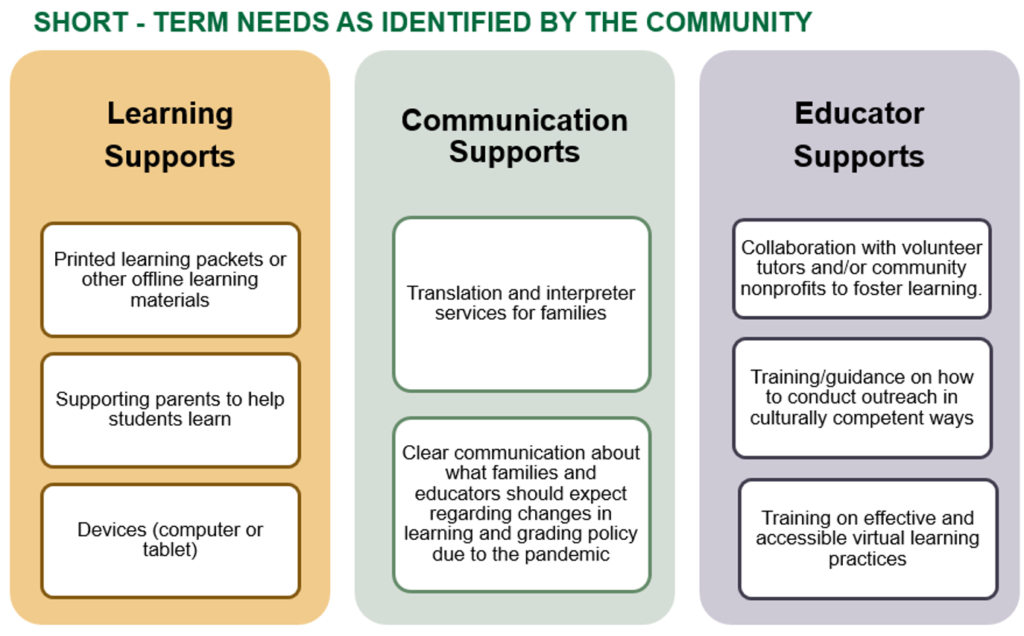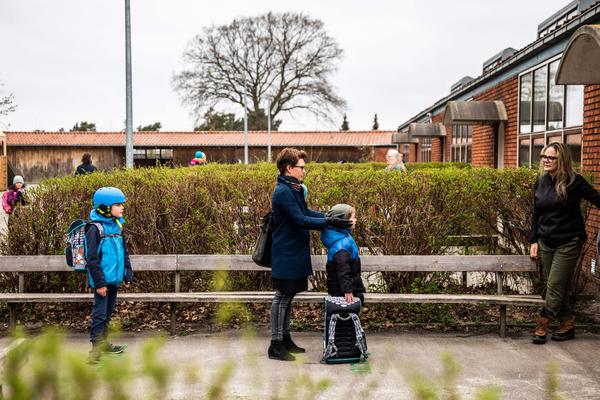Our Schools: Going Back to Normal Isn’t an Option
The COVID-19 crisis has brought out some of the best in people. Everywhere around our world of public education, stories of heroic teachers, inventive students, and caring communities pervade the airwaves.
But COVID-19 also exposed some of the most persistent challenges in our education system. It’s going to take heroic levels of collaboration to not only get our schools back on track, but better designed for the inequities that have been magnified.
In a survey conducted by Rodel, 859 Delawareans told us where they think we should start. They gave insights into the immediate, short-term, needs in the wake of COVID-19, as well as the longer-term needs for when students and teachers resume class—across categories like student learning, family communication, educator support, and wraparound or non-instructional services.
What we heard wasn’t particularly surprising for those deeply involved in education, but it validated a lot of what we already knew. With nearly 140,000 students and their families in Delaware navigating a new frontier of all-digital learning, respondents said Wi-Fi/broadband infrastructure to support remote learning (53% response) should be a major priority. With so much uncertainty on everything from grading to school re-opening, respondents told us that clear communication (from schools to families, and schools to teachers) was also a big deal.

Respondents were especially concerned about our most vulnerable students. Over 21,000 Delaware students qualify as needing special education, and 12,000 students speak a native language other than English. More than 50,000 students come from low-income households. So naturally, Delawareans are concerned about things like meeting specific learning needs for students with different learning needs, translation services for non-English speaking families (50% response), and access to mental health supports like school counselors, social workers, and school psychologists (74% response).
Without some forward-thinking ideas on how to reach those kids who are traditionally hard to reach, the “gaps” in their learning will become chasms. Even for those students who had online access, the remote experience was uneven, but for some students, like those in Western Sussex, upwards of 30% don’t have internet access. Assuming we are back in September, and that’s a big if, some of our young people will have gone the better of six months without traditional academic support. This is more than double the normal “summer learning loss” and is now being called the “COVID Slide.” If we don’t collectively listen and respond to the needs of our communities and educators, the long term implications of this gap will be profound.
As one teacher told us: “Right now, school is taking a backseat to life for students who are working full time in grocery stores or caring for younger children while parents work in essential jobs or facing a daily insecurity in having their basic needs met. When I am able to connect with them, they express they miss school and will try to get the work done, but few do.”

Many of these issues—better broadband, social-emotional supports, the need to personalize the education experience—have been simmering on the backburner in Delaware for years. Now is the time to address them head on. This in-between phase, as we prepare to close out a strange and momentous school year, presents a big opportunity. There are more questions than answers on what the return to school might look like, but some of the needs are crystal clear.
Educators realize they can’t do this alone. Twenty-three percent of our survey respondents said that coordinating with public and private sector partners outside of school will be critical to addressing all student needs. This is where Delaware can do something special. For example, we are already seeing the Delaware Community Foundation, Philanthropy Delaware, the United Way, and DANA working together on a coordinated COVID Emergency Response Fund with generous individual and corporate donations. The public sector is also stepping up. I talked last week with a panel of Delawareans to hear parent, educator, and nonprofit perspectives. They underscored the array of creative techniques teachers are using; impressive balance parents are striking while working and supporting students; and collaboration across districts, charters, and nonprofits to ensure access to wraparound services. This week, Governor Carney and Secretary of Education Bunting announced a public strategy to plan for the safe reopening of Delaware school buildings. Three working groups—one each focused on health and wellness, academics and equity, and operations and services—will connect to our communities through open forums so that the ideas and concerns of Delawareans ground their work.
As we collectively design for this new world, I have two requests:
- That we design for what we want to see rather than what we had.
- That we continue to be selfless in working together across sectors to get this done.
The goal isn’t to get back to normal. School as we knew it didn’t work for a lot of our young people. The goal should be to design for universal access and success. How can we ensure every child has access to the internet and has the academic, mental and physical health supports they need to thrive? Now could be our chance to rethink how we unlock the potential of all our children. Our survey respondents envisioned a system where students move through education based on mastery of skill rather than seat time, lessons personalized to the individual. They envisioned a system in which social workers delivered school supplies and basic needs to families; where telehealth could open the door to virtual health and mental health screenings. Now is a time to rebuild with fresh eyes.
And the old adage still holds, “It’s amazing what we can get done if no one is looking to take credit.” I’m inspired but what I’ve seen among our teachers, parents, our non-profits, and for-profits. But this will be a long haul. We need to keep listening to one another, and working to do our part.
It’s going to take creativity and passion to deliver what our kids and teachers deserve. But I’m optimistic. People are resilient (especially young people). I’m encouraged every day by the collaboration and bold action I’m seeing throughout Delaware. There’s a lot of work ahead, but I hope we can all agree that going “back to normal” isn’t an option.